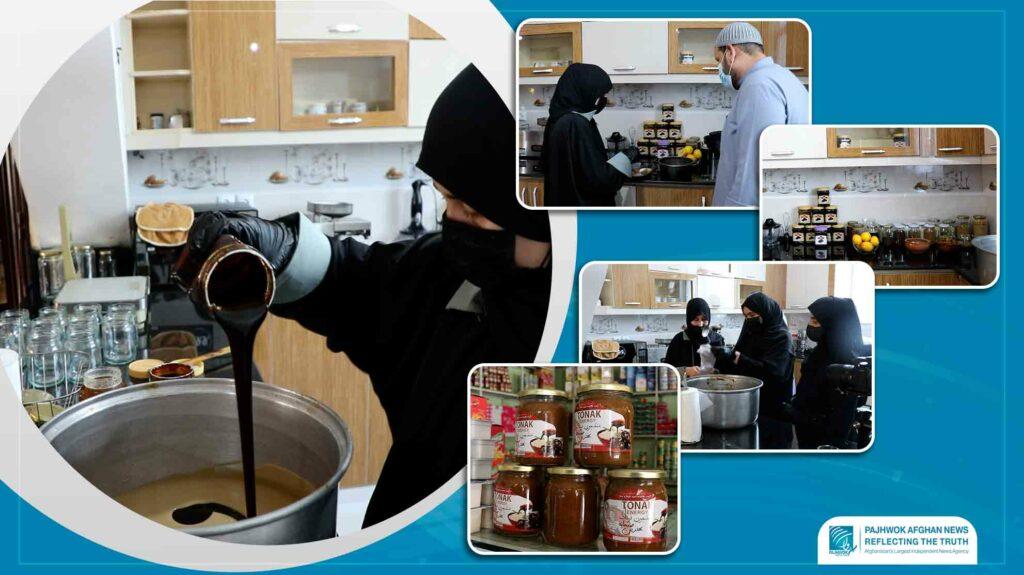KABUL (Pajhwok): In the heart of a narrow alley in Kabul, Susan Qazizada set out to fulfill a dream—creating Majoun, a traditional health blend of sesame, dates, and honey.
Although she completed her studies in general medicine, Susan was unable to sit the “Exit” exam, which would have qualified her to work in a medical facility. Instead, she chose to forge her own path.
A resident of the Sarkotal area in Khair Khana, Kabul, Susan graduated in 1401 (2022) from Mora University. Like many others, she had been waiting to take the Exit exam in hopes of securing employment in the healthcare sector. However, the suspension of girls’ education shattered that goal.
She reflects: “Unexpectedly, disappointment became my motivation. I was constantly searching for something beneficial—for myself, my family, and my community—something that could serve both as a remedy and a source of income.”
From medicine to making Majoun
During her internship, Susan encountered numerous patients suffering from anaemia, fatigue, stress, and chronic pain.
She also noticed a concerning number of individuals with osteoporosis, even those who regularly consumed dairy products and were exposed to sunlight. This observation planted the seed of an idea.
Turning to traditional medicine and online resources, she began researching natural remedies. It was then she discovered that sesame is a rich source of calcium.
She learned that in Iran, people often consume sesame paste with date syrup as part of their daily diet. This inspired her to try something similar in Afghanistan, where high-quality sesame is readily available.
With support of her husband, Susan began her small-scale production at home.
Launching Majoun Business with $2,000
Six months ago, Susan launched her home-based Majoun venture with an initial investment of $2,000. Her first customers were impressed enough to return, quickly becoming regular buyers.
Today, she produces two varieties of Majoun: A basic blend made with date syrup, honey and sesame paste.
A special version fortified with ten types of nutritious powders, including almond, fig, dried oleaster, ginger, coconut, clove, cinnamon, cardamom and ginseng.
“We use no chemical preservatives,” she explains. “Instead, we rely on natural ones like clove, cinnamon and lemon juice. Adding synthetic ingredients would only diminish its nutritional value.”
The production process begins by washing and drying the sesame seeds, followed by roasting and grinding them into a paste using a specialised machine. The paste is then blended with honey and date syrup. In the premium version, the additional powdered ingredients are mixed in.
Susan packages the Majoun in 500-gram and 1-kilogram jars. Depending on demand, she prepares 10 to 20 jars each day.
She says: “This Majoun benefits everyone—children, pregnant and breastfeeding women, the elderly, athletes and even diabetic patients. Those looking to lose weight can consume it in small amounts, while those aiming to gain weight can enjoy it with bread.”
Susan dreams of one day opening a clinic where she can recommend her product as a dietary supplement: “It’s a complete food, not a medicine—but it has healing properties.”
A family venture
Behind Susan’s success stands her husband, Zekruddin Qazizadah, who plays an active role in the business.
“I’ve supported my wife at every step,” he told Pajhwok. “God willing, we plan to open a larger facility to produce not only elixirs but also sugar-based halwa and other nutritious breakfast items.”
He currently assists with ingredient sourcing, packaging, and marketing.
Expert opinion: Women like Susan drive economic empowerment
Zahir Behzad, an economic analyst, praised Susan’s initiative: “In Iran, women-led businesses contribute 12% of the national income. In Turkey and Pakistan, the figures are even higher.”
He believes that, with adequate security and a supportive environment, Afghan women entrepreneurs have the potential to generate income, create jobs, and contribute meaningfully to the national economy.
Customers
Local shopkeeper Mahmood Omari commented: “This Majoun tastes excellent, and its quality is high. Customers often ask for it, and we use it ourselves too. Demand is strong.”
Another Kabul resident, Freshta Ghousi, has been using Majoun for six months and has noticed significant benefits: “It was particularly useful during Ramadan—I felt full throughout the day.”
sa/ma







GET IN TOUCH
NEWSLETTER
SUGGEST A STORY
PAJHWOK MOBILE APP